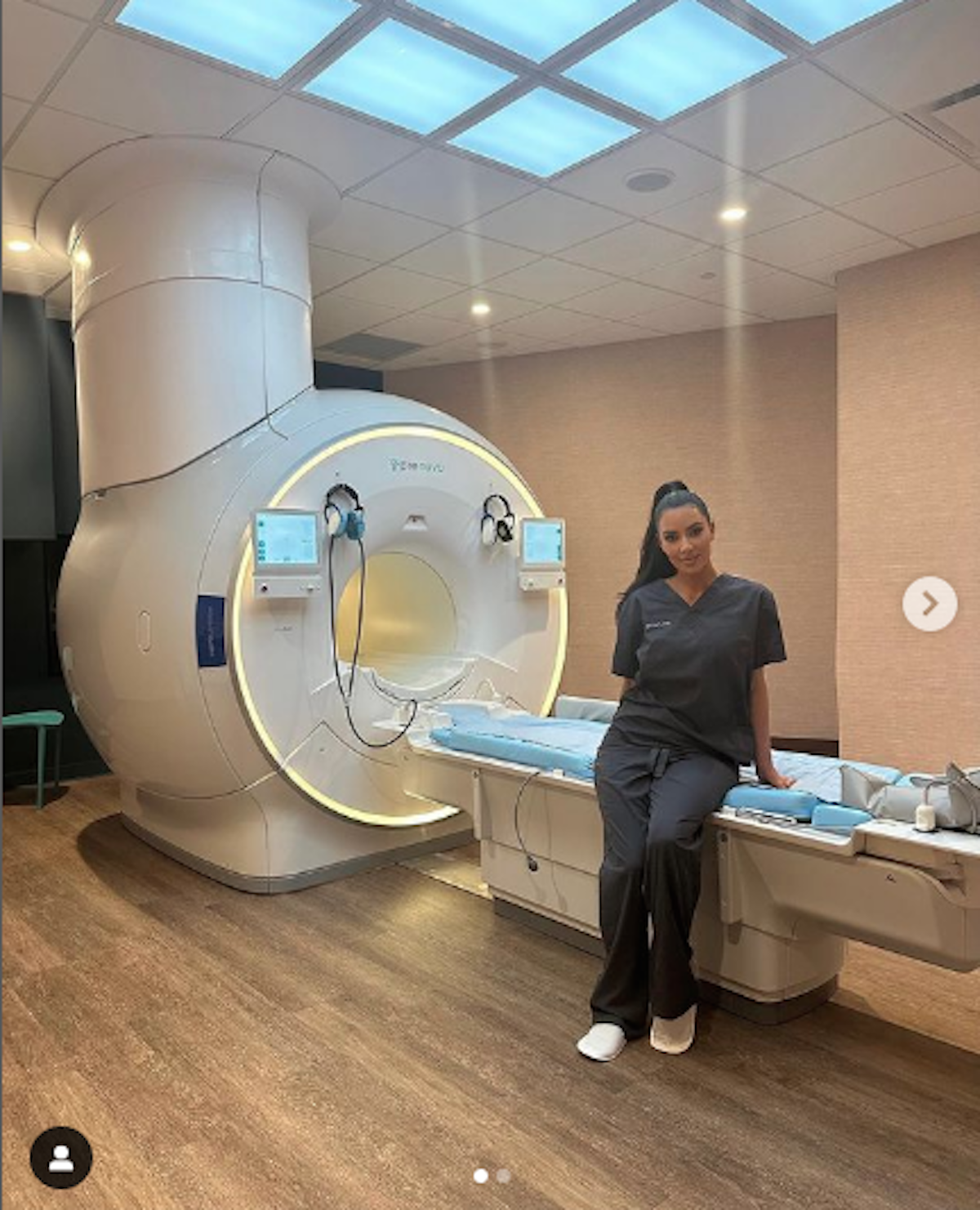Cancer Prevention: Full Body Scans Should Not Replace Proven Screenings
- SKIMS founder and billionaire reality TV star Kim Kardashian recently underwent a “life-saving” Prenuvo’s full body MRI, which costs more than $2,500, to screen for cancers. However, her decision to do so has sparked concerns over the harms of early screenings and has prompted backlash from fans in regard to the pricing of the preventative measure.
- Although SurvivorNet commends Kim’s message of taking control of your health, it important to note that Prenuvo’s full body MRIs are not part of regular screening guidelines for the public and experts say this should absolutely not replace traditional screenings
- The American College of Preventive Medicine recommends against using whole-body scans for early tumor detection in asymptomatic patients.
- In a National Cancer Institute-funded study, published last year in the Annals of Internal Medicine, researchers found that cancer-screening guidelines “don't adequately capture the potential harms of cancer screening.”
- MRI scans are typically considered a safe and non-invasive imaging procedure with minimal risks associated. However, like any medical procedure, it is essential to be aware of potential risks and safety concerns so that you can make informed decisions about your healthcare.
Regular screenings are crucial and being your own advocate is key in receiving a diagnosis, however, Kim’s decision to undergo Prenuvo’s full body MRI, a pricey body scan costing more than $2,500, has prompted backlash from fans. It also reminds us how early detection isn’t always beneficial.

The 42-year-old mom of four and psoriasis warrior, who insisted the post was “#NotAnAd,” explained further, “It was like getting a MRI for an hour with no radiation. It has really saved some of my friends lives and I just wanted to share #NotAnAd.”
Although SurvivorNet commends Kim’s message of taking control of your health, it important to note that Prenuvo’s full body MRIs are not part of regular screening guidelines for the public.

Not only is the whole body, radiation-free MRI scans not part of regular screening guidelines, but it’s also expensivesomething Kim’s fans weren’t shy to voice their opinions on.
One fan commented on the former wife of Kanye West’s post, “Kim, this is for wealthy people. People can't afford food right now,” while another wrote, “The fact majority of society can't even afford insurance for a simple wellness checkup.”
RELATED: What You Need to Know About MRI Scans
Others wrote, “Maybe donate some of your millions to get people scanned,” “Wow thanks so much for sharing something 90 percent of the population can't afford!” and “Kim people can't afford cancer treatment after diagnosis how can they afford preventative care.”
According to Prenuvo’s website, the company prides the machine in being the “most precise, comprehensive whole body MRI scan that exists today. We use proprietary cutting-edge acquisition techniques, and unique analytic software to make early and accurate diagnoses.”
It add, “A single Prenuvo scan covers 26 regions/organs of the body at the clinical diagnostic quality which enables us to screen for and diagnose more than 500 conditions, including most solid tumors at Stage 1.”
However, the scans certainly appear to be pricey, with a 20-minute torso scan costing $999, a 60-minute whole body scan costing $2,499, and a 45-minute head and torso scan costing $1,700.
Potential Harms of Early Screening
Early detection is often advised in certain cases, starting at specific ages, depending on the type of disease, but in the case of getting this type of full body scan, this type of preventative measure may not have ideal outcomes.
In fact, the American College of Preventive Medicine, recommends against using whole-body scans for early tumor detection in asymptomatic patients.
They also urge low-risk women aged 65 years or older not to undergo cervical cancer and for men not to have routine PSA-based screenings for prostate cancer.
Meanwhile, a National Cancer Institute-funded study, published September 27, 2023, in the Annals of Internal Medicine, researchers found that cancer-screening guidelines “don't adequately capture the potential harms of cancer screening.”
It’s evident that screenings like, mammograms, colonoscopies, and HPV or Pap smears, can help people find precancerous growths, receive treatment early on, and reduce deaths from disease, but the NCI warns, “screening can also cause various harms including physical harm, worry and stress, inaccurate results, and unnecessary follow-up procedures.”
Paul Doria-Rose, Ph.D., chief of NCI's Healthcare Assessment Research Branch, said says screening for cancer is recommended only when the potential benefits outweigh the potential harms.
“If there’s overwhelming evidence of a net benefit of a screening test, we don’t want to scare somebody off" from getting screened, Dr. Doria-Rose explains, according to the NCI.
"But by the same token, if there’s a risk that [a serious harm] could happen if you have a screening test or a follow-up diagnostic test, then it’s a physician’s obligation to inform patients about what the risks of those procedures are.”
The NCI lists the potential screening test harms as:
- Physical harm
- Radiation exposure
- False-negative result
- False-positive result
- Over diagnosis
- Psychological harm
MRI Risks and Safety
MRI scans are typically considered a safe and non-invasive imaging procedure with minimal risks associated. However, like any medical procedure, it is essential to be aware of potential risks and safety concerns so that you can make informed decisions about your healthcare.
Magnetic Field and Metallic Objects:
- One of the primary concerns during an MRI scan is the powerful magnetic field. This field can pose a risk if you have any metallic implants or objects inside your body that could be affected or attracted by the magnet.
- Before your MRI scan, you’ll be thoroughly screened and asked to disclose any metallic or electronic implants, such as pacemakers, cochlear implants, or surgical clips. The presence of these devices can pose risks or impair the image’s quality, so it is crucial to inform the staff beforehand to ensure your safety.
- Loose metallic objects, like jewelry, should also be removed as they can pose a hazard during the procedure. You will be provided with a secure locker to store these items safely.
Contrast Agents:
- In some cases, a contrast agent may be administered to enhance the images of certain body parts. Mild side effects, such as feeling warm or experiencing a metallic taste in your mouth, can occur but are typically short-lived.
- Rarely, allergic reactions to the contrast agent may occur. Inform your healthcare provider if you have allergies, particularly to iodine or gadolinium, or if you have experienced reactions to contrast agents in the past.
- In patients with compromised kidney function, there is a risk of developing a condition called nephrogenic systemic fibrosis (NSF) due to the contrast agent. If you have concerns about your kidney function, discuss them with your healthcare provider prior to the MRI scan.
Claustrophobia and Anxiety:
- For some individuals, the confined space of the MRI machine may trigger feelings of anxiety or claustrophobia. Share any previous experiences or concerns with your healthcare team, as they can help provide strategies to cope with these feelings or potentially prescribe sedative medication to ease your anxiety.
- MRI scans are generally safe procedures with few risks, but it is essential to be aware of potential hazards and communicate with your healthcare team to ensure your comfort and safety. If you have any concerns regarding the risks associated with an MRI scan, do not hesitate to discuss them with your healthcare provider.
Frequently Asked Questions
It’s normal to have a few questions about MRI scans, especially if it’s your first time having one. Here are some frequently asked questions to help you better understand this diagnostic tool:
1. Can anyone have an MRI?
In most cases, yes, but there are a few exceptions. Those with certain metallic implants or electronic devices (such as pacemakers) may not be suitable candidates for an MRI. Always consult your doctor before undergoing an MRI scan for individual guidance.
2. How long does an MRI scan take?
The duration of an MRI scan can vary greatly, typically ranging from 15 minutes to over an hour. The specific length of time depends on the type and complexity of the study, as well as the area of the body being scanned.
3. Will an MRI scan hurt?
An MRI scan is a noninvasive and painless procedure. However, you may experience discomfort from lying still for an extended period or feel anxious due to the machine’s sound and confined space. In most cases, these discomforts are mild and manageable.
4. What should I expect during an MRI scan?
You will be asked to remove all metal objects, like jewelry, and change into a hospital gown. During the procedure, you will lie on a padded table that slides into the MRI machine. The machine will generate loud noises, but you will likely be provided with earplugs or headphones to minimize the noise. You may be asked to hold your breath briefly, and it’s essential to remain completely still during the scan.
5. When will I get my MRI results?
The length of time it takes to receive your MRI results can vary, but you should expect to wait at least a few days. A radiologist will interpret the images from your MRI scan and send a report to your healthcare provider, who will then discuss the results with you in a follow-up appointment.
6. Are there any known side effects or dangers?
MRI scans are considered very safe, with no known harmful side effects. However, there are a few risks associated with MRI scans, such as the potential for an allergic reaction to contrast agents and potential heating of certain metallic implants. Overall, the benefits of an MRI scan typically outweigh these risks for most patients, but it’s essential to discuss your individual situation with your healthcare provider.
While this FAQ covers common questions about MRI scans, your healthcare provider is the best resource for any questions or concerns you may have. Be sure to reach out to them with any inquiries to ensure you are well-informed and prepared for your MRI scan.
Protocols For Screening For Major Cancer Types
Despite the negatives listed above, it is important to remember that early detection is key in many cases, for example, women are advised to begin screening for breast cancer at age 40 and people with no family history of colon cancer should begin screening at age 45.
Additionally, cervical cancer screening is advised to begin at 25 with a primary HPV test (a more "sensitive" test than a Pap test) and continue every 5 years, according to American Cancer Society (ACS) guidelines.
Also, the guidelines for prostate cancer screening depend largely on your risk for the disease and that's based on several factors including family history, genetics, age, and race.
Screening is simple and consists of a prostate-specific antigen (PSA) blood test and a digital rectal exam to feel the prostate gland. “It's slightly uncomfortable but painless, and takes less than 30 seconds,” Dr. Edwin Posadas, Director of Translational Oncology and the Medical Director of the Urologic Oncology Program at Cedars-Sinai Medical Center, previously told SurvivorNet.
There's No One Definitive Symptom for Prostate Cancer, But There Are Clues
Contributing: SurvivorNet Staff
Learn more about SurvivorNet's rigorous medical review process.


